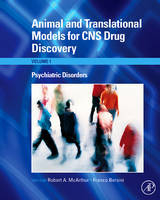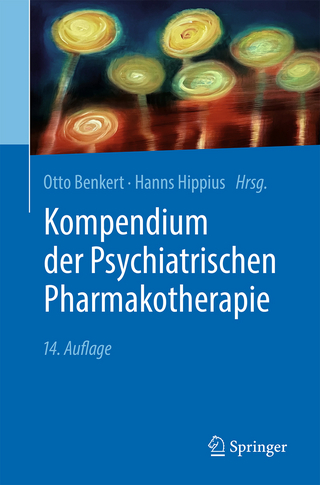
Animal and Translational Models for CNS Drug Discovery: Psychiatric Disorders
Academic Press Inc (Verlag)
978-0-12-373856-1 (ISBN)
Psychiatric Disorders is written for researchers in both academia and the pharmaceutical industry who use animal models in research and development of drugs for psychiatric disorders such as anxiety, obsessive-compulsive disorder, depression, schizophrenia, bipolar disorder, ADHD, and autistic spectrum disorder. Psychiatric Disorders has introductory chapters expressing the view of the role and relevance of animal models for drug discovery and development for the treatment of psychiatric disorders from the perspective of (a) academic basic neuroscientific research, (b) applied pharmaceutical drug discovery and development, and (c) issues of clinical trial design and regulatory agencies limitations. Each volume examines the rationale, use, robustness and limitations of animal models in each therapeutic area covered and discuss the use of animal models for target identification and validation. The clinical relevance of animal models is discussed in terms of major limitations in cross-species comparisons, clinical trial design of drug candidates, and how clinical trial endpoints could be improved. The aim of this series of volumes on Animal and Translational Models for CNS Drug Discovery is to identify and provide common endpoints between species that can serve to inform both the clinic and the bench with the information needed to accelerate clinically-effective CNS drug discovery.
This is the first volume in the three volume-set, Animal and Translational Models for CNS Drug Discovery 978-0-12-373861-5, and is also available for purchase individually.
Dr. McArthur began his professional career investigating the role of serotonin on feeding behaviour at the Clarke Institute of Psychiatry in Toronto, Canada. This interest led him to complete a PhD in the psychopharmacology of feeding behaviour and macronutrient selection with John Blundell at the University of Leeds, Leeds, UK. In 1981 he joined Beecham Pharmaceuticals to work on adrenergic involvement in energy expenditure and obesity. In 1983 Dr McArthur began working on M1 functional agonists for the treatment of Alzheimer disease and was responsible for demonstrating the initial procognitive effects of Sabcomeline. Following the merger of Beecham with SmithKline French, Dr McArthur was appointed Business Development Executive at I.T.E.M-Labo, Paris working with Roger Porsolt in behavioural pharmacology contract research. In 1992, Robert was appointed Head of Behavioral Pharmacology at Farmitalia Carlo Erba, later Pharmacia in Milan. His lab was responsible for the preclinical behavioural pharmacology of Sabcomeline (Alzheimer’s and schizophrenia); Safinamide (epilepsy and Parkinson’s); Reboxetine (depression); Cabergoline (Parkinson’s); Nicergoline (Mild Cognitive Impairment); and Amperozide (alcoholism). He is listed as an inventor in 19 issued patents and applications of which he is the principal inventor in 3. In 1998, Robert transferred to the Pharmacia and Upjohn Company in Kalamazoo, Michigan where as senior behavioural pharmacologist responsible, he worked on mutant mouse characterizations, the establishment of a primate unit assessing cognitive changes in monkeys (CANTAB), and development of anxiety models in marmosets. Soon after the merger of Pharmacia and Upjohn with Monsanto-Searle, Robert returned to Europe where in 2001 he founded the consulting company, McArthur and Associates GmbH in Basel. Robert has since worked on a series of projects for both large Pharma as well as biotechs, including further primate work in Parkinson’s, development of behavioural pharmacology expertise, novel target validation, due diligence, medical writing, strategy evaluation, scientific advisor and as an expert witness. Dr McArthur has pursued his academic interests in translational neuroscience. In 2003, Robert was appointed as a visiting Associate Research Professor in the Department of Neuroscience (Division of Behavioural Neuroscience) at the Karolinska Institute in Stockholm. He has written and co-edited extensively on the subject of the clinical and translational relevance of animal models of CNS disorders. He has authored 43 peer-reviewed papers, 13 book chapters, co-author on 1 book and senior editor of a three-volume set on translational value of animal models for CNS drug discovery. He has served as section editor (CNS) for Current Opinion in Investigational Drugs and is on the editorial board of Drugs of the Future. In 2009 he was appointed an independent scientific expert evaluator for the European FP7-Health call. Franco Borsini, Head, Central & Peripheral Nervous System and General Pharmacology Area - R&D Department, sigma-tau SpA, Pomezia (Rome), Italy
Preface to Psychiatric Disorders Volume:
What Do You Mean By “Translational Research? An Enquiry through Animal and Translational Models for CNS Drug Discovery: Psychiatric Disorders
Robert A McArthur and Franco Borsini
1.Mark J. Millan. The Discovery and Development of Pharmacotherapy for Psychiatric Disorders: A Critical Survey of Animal and Translational Models, and Perspectives for their Improvement
2.L. Winsky et al. Drug Discovery and Development Initiatives at the National Institute of Mental Health: From Cell-Based System to Proof of Concept
3.J. McEvoy and Freudenreich. Issues in the Design and Conductance of Clinical Trials
4.Klaus A. Miczek. Challenges for Translational Psychopharmacology Research – The Need for Conceptual Principles
5.T. Steckler et al. Developing Novel Anxiolytics: Improving Preclinical Detection and Clinical Assessment
6.D. Joel et al. Animal Models of Obsessive-Compulsive Disorder: From Bench to Beside Via Endophenotypes and Biomarkers
7.J. Cryan et al. Developing More Efficacious Antidepressant Medications:
Improving and Aligning Preclinical and Clinical Assessment Tools
8.D. Jones et al. Developing New Drugs for Schizophrenia: From Animals to the Clinic
9.C. Large et al. Developing Therapeutics for Bipolar Disorder (BPD): From Animal Models to the Clinic
10.R. Tannock et al. Towards a Biological Understanding of ADHD and the Discovery of Novel Therapeutic Approaches
11.J. Bartz et al. Preclinical Animal Models of Autistic Spectrum Disorders (ASD)
12. S. Doran et al. Translational Models of Sleep and Sleep Disorders
Epilogue:
Translational Models for the 21st century: Reminiscence, Reflections and Some Recommendations
Paul Willner, Franco Borsini, and Robert A McArthur
| Erscheint lt. Verlag | 17.11.2008 |
|---|---|
| Verlagsort | San Diego |
| Sprache | englisch |
| Maße | 184 x 260 mm |
| Gewicht | 1140 g |
| Themenwelt | Medizin / Pharmazie ► Medizinische Fachgebiete ► Pharmakologie / Pharmakotherapie |
| Medizin / Pharmazie ► Medizinische Fachgebiete ► Psychiatrie / Psychotherapie | |
| Technik | |
| ISBN-10 | 0-12-373856-3 / 0123738563 |
| ISBN-13 | 978-0-12-373856-1 / 9780123738561 |
| Zustand | Neuware |
| Haben Sie eine Frage zum Produkt? |
aus dem Bereich


